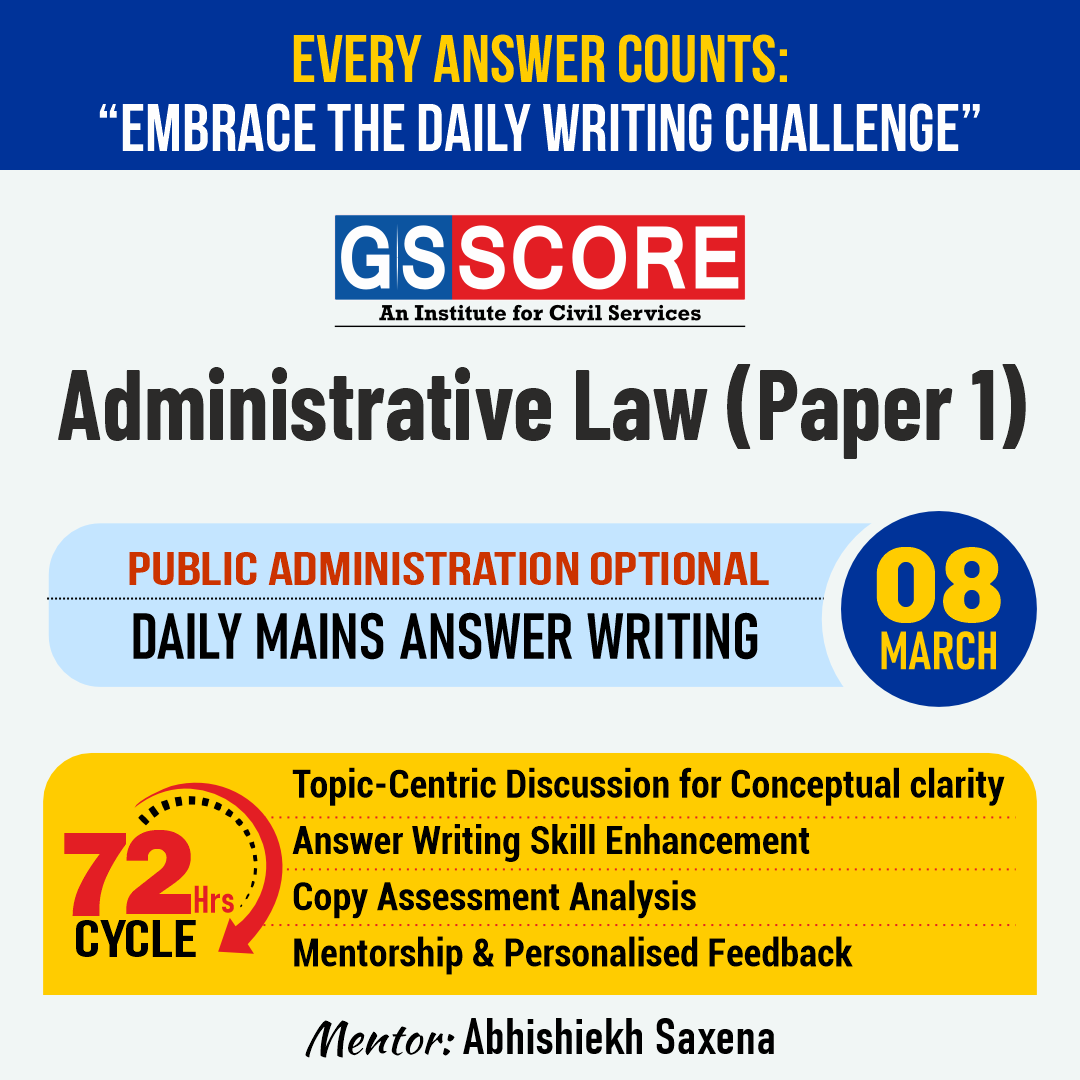


Instruction:
- There will be 2 questions carrying the First Question is-10 marks Write your answers in 150 words and the Second Question is-15 marks Write your answers in 250 words.
- Any page left blank in the answer-book must be crossed out clearly.
- Evaluated Copy will be re-uploaded on the same thread after 2 days of uploading the copy.
- Discussion of the question and one to one answer improvement session of evaluated copies will be conducted through Google Meet with concerned faculty. You will be informed via mail or SMS for the discussion.
Question #1. Tribunals and Judicial review acts as safety valve against administration’s flaws and excesses. Comment. 10 marks (150 words)
Question #2. Dicey’s conceptualisation of “Rule of Law” was flawed and he failed to appreciate the importance of “Administrative law”. Critically Analyse. 15 marks (250 words)
(Examiner will pay special attention to the candidate's grasp of his/her material, its relevance to the subject chosen, and to his/ her ability to think constructively and to present his/her ideas concisely, logically and effectively).
STEPS & INSTRUCTIONS for uploading the answers
Step 1 - The Question for the day is provided below these instructions. It will be available at 7:00 AM.
Step 2 - Uploading of Answers : Write the answer in A4 Sheet leaving proper margins for comments and feedback and upload the PDF in MY ACCOUNT section. Click on the option of SUBMIT COPY to upload the PDF.
Step 3 - Deadline for Uploading Answers: The students shall upload their answers by 7:00 PM in the evening same day. The first 50 copies will be evaluated.
Step 4 - Feedback : Mentors will give their feedback for the answers uploaded. For more personalised feedback, join our telegram channel by clicking on the link https://t.me/mains_answer_writing_cse . A one-to-one session will be conducted with the faculty after copy evaluation in 72 Hrs.
Model Answer
Question #1. Tribunals and Judicial review acts as safety valve against administration’s flaws and excesses. Comment. 10 marks (150 words)
Approach:
Give basics of both and then analyse as per question statement.- Pay special emphasis on how Tribunals exercise control and accountability on administration
The development of administrative law in a modern welfare state has made administrative tribunals a necessity. Administrative law is not codified per se, its interpretation lies with the administrative tribunals. However, it puts the public official in a better position than the public. Administrative tribunals, following principles of natural justice, adjudicate any act of administrative excess.
For example, in the area of tax administration, an aggrieved citizen of India can approach Income Tax Appellate Tribunal. At the same time, administrative tribunals also act as a safeguard against administrative weaknesses. For instance, a dispute within the administration itself regarding appointments to public office posts is often due to administrative laxity or personal favour. Such disputes are adjudicated by Central and State Administrative Tribunals in India.
However, administrative tribunals do not follow a civil procedure code and their decision may not be adequate or fair sometimes because they are presided often by administrative experts rather than law experts. Judicial review is the the process by which a Court (generally the High Court or above in India) looks into a challenge against an administrative action. It is a claim to review the lawfulness of an enactment or a decision, action or failure to act in relation to the exercise of a public function. For example in India, Article 32(2) and Article 226(1) of the Constitution provide mechanism for enforcement of fundamental rights against the administrative authorities through judicial review.Hence, administrative tribunals and judicial review are not only instruments of interpretation of law but also safeguards against administrative weaknesses and excesses.
Question #2. Dicey’s conceptualisation of “Rule of Law” was flawed and he failed to appreciate the importance of “Administrative law”. Critically Analyse. 15 marks (250 words)
Approach:
• Give basics of Dicey’s views on both.
• Find issues with his views and analyse them
• Conclude.
Based on the principles of supremacy of law and equality before law, Dicey’s rule of law is a fundamental doctrine of any legal system. Dicey was an individualist from the era of ‘laissez faire’ in England. His concept of rule of law is very rigid and against discretionary powers in the hands of administration because he thought discretion would lead to arbitrariness.
Dicey had developed a rigid understanding of the ‘Rule of Law’ based on equal treatment before the law, no discretion provided to administration and that laws flow from traditions and customs. According to him administrative law which proposes separate rules and institutions for administrative jurisprudence is in violation of the rule of law.
It can be seen that Dicey lacked understanding of both ‘Rule of Law’ and ‘Administrative Law’. In the French system of Driot administratif, it was not that administrator were not held accountable, only a separate mechanism had been designed to hold them accountable. In fact greater justice was provided to the citizens from the administrative machinery through such an institutional mechanism. Dicey also failed to explain the technical inconsistencies in his model “Rule of Law’ administration in the United Kingdom which lacks Judicial review and where the Parliament is supreme. Even though Administration comes under a unified system, yet legislative excesses have no checks and balances.
Whereas in practice, Rule of Law cannot exist without administrative law, since it spells out the responsibility of the administration in order to enforce the laws of the land. Eg. Lokpal Act can be passed but until the rules and regulations for operationalising are not put in place, the Rule of this law will not be complete. Therefore administrative law is a sine qua non for Rule of Law, since without it, it will become directionless.
The delegated nature of administrative law must have adequate checks and balances in place to uphold Rule of Law and curtail arbitrariness eg. Parliamentary Committees, Judicial review etc.
Dicey failed to realise the dynamic nature of the administration. Now a days, in modern welfare state, providing some degree of discretion to the administration is inevitable. There is a clear distinction between arbitrary power which may be taken against the concept of rule of law, and discretionary power which may be conferred on administration with proper guidelines to make it more effective and efficient.
Dicey also criticised the system of Droit Administratif in France, and failed to distinguish between administrative jurisprudence and ordinary law. He opposed separation of administrative courts from ordinary courts and believed administration, just like ordinary citizens, should be subject to same law. However, he overlooked the fact that administration, sometimes, acts suo motu within the ambit of administrative law. Thus he misunderstood the real nature and significance of administrative law.
Conclusion
Due to above shortcomings and increasing complexity of welfare state, the modern concept of rule of law has taken a detour from negative connotation of Dicey to a wider implication that under the rule of law, administration in a free society should function so as to create conditions in which the dignity and rights of a man are upheld.


